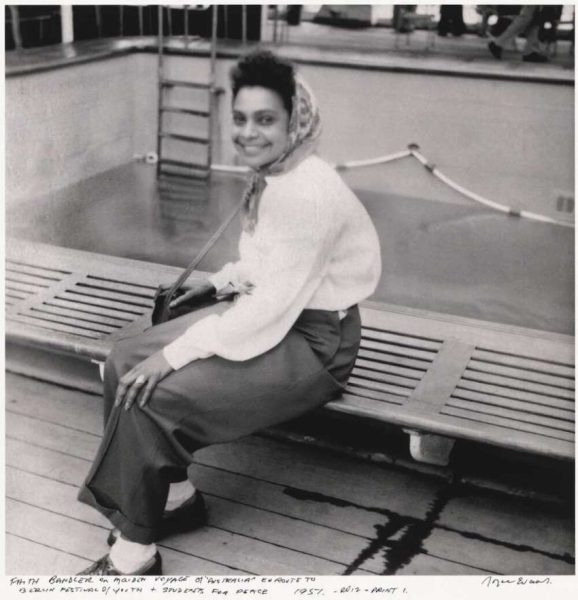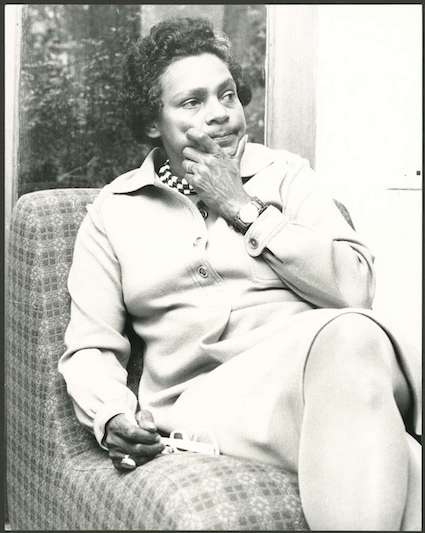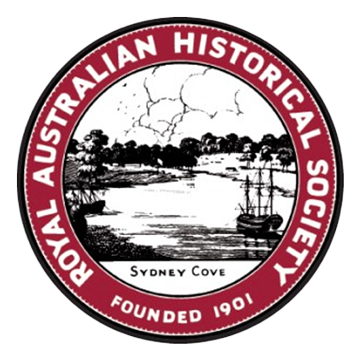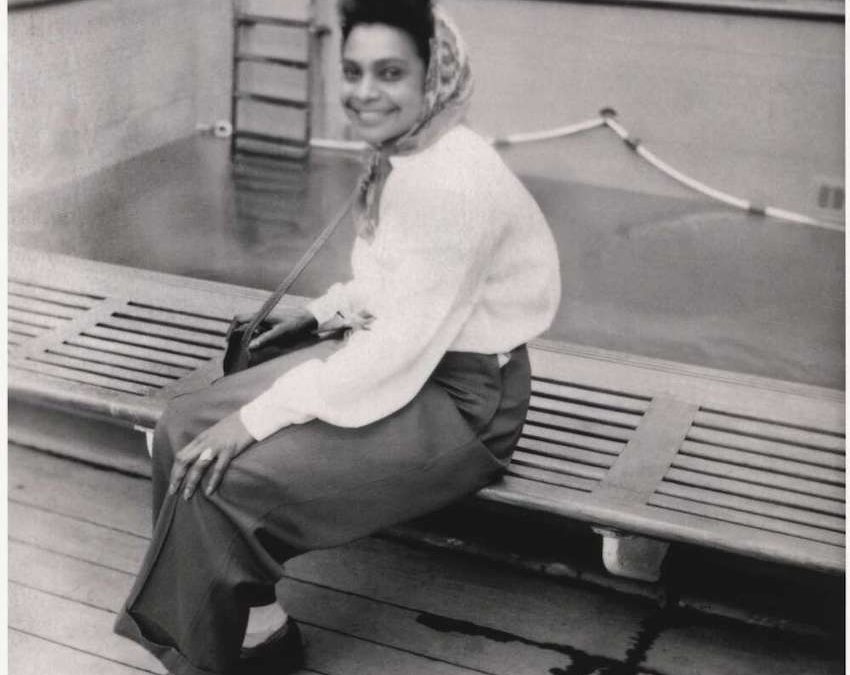Written by Elizabeth Heffernan, RAHS Volunteer
To celebrate Women’s History Month in 2021, the Royal Australian Historical Society will continue our work from previous years to highlight Australian women that have contributed to our history in various and meaningful ways. You can browse the women featured on our webpage, Women’s History Month.
Aboriginal and Torres Strait Islander people are advised that this webpage contains the names of people who have passed away.
“My belief is in people,” said activist and author Faith Bandler in a 1993 interview. “I fixed my faith in people.” [1] Best known for her decade-long campaign towards the 1967 referendum, Faith – born Ida Faith Mussing – was also a staunch advocate for the rights of her own South Sea Islander people, and a woman who valued family above all else.
Faith was born in the tiny town of Tumbulgum in northern New South Wales. Her mother Ida was Australian-born, of Indian and Scottish descent. Her father Peter, born Wacvie Mussingkon, was a South Sea Islander who had been kidnapped from his Vanuatu home and enslaved on a Mackay sugar plantation when he was just thirteen, a practice known as ‘blackbirding’. Wacvie was one of more than 60 000 South Sea Islanders blackbirded into the Queensland sugar industry in the second half of the nineteenth century. He died when Faith was only five. [2]

FAITH BANDLER ON HER WAY TO BERLIN IN 1951, PHOTOGRAPHED BY JOYCE EVANS. THE CAPTION READS: “FAITH BANDLER ON MAIDEN VOYAGE OF ‘AUSTRALIA’ ENROUTE TO BERLIN FESTIVAL OF YOUTH + STUDENTS FOR PEACE.” [IMAGE COURTESY NATIONAL LIBRARY OF AUSTRALIA, NLA.OBJ-153310621-1.]
Influenced and aided by her contemporaries, notably Pearl Gibbs and Jessie Street, Faith became a significant advocate for Aboriginal rights from the 1950s to the 1970s. She helped form the Aboriginal-Australian Fellowship, which played a vital role in the 1967 referendum, and served on the Federal Council for the Advancement of Aborigines and Torres Strait Islanders (FCAATSI) for several years. Yet the ‘yes’ vote Faith had worked so hard for did nothing to help the cause of her own people. Some 20 000 descendants of blackbirded South Sea Islanders were enduring the same discrimination as Aboriginal and Torres Strait Islander people, with none of the new legislative protections. Some claimed to be Aboriginal or Torres Strait Islander simply to survive. [4]

FAITH PHOTOGRAPHED BY BRUCE HOWARD, C. 1975. [IMAGE COURTESY NATIONAL LIBRARY OF AUSTRALIA, NLA.OBJ-147735863.]
Faith spent the next twenty years working to right this injustice. Her campaigning resulted in a 1994 government package of programs and funding for the South Sea Islander community. In the meantime Faith published a number of books including Wacvie and Warou, fictionalised retellings of her father and brother’s lives respectively. She visited Ambrym, her father’s island home, in 1975. “Just putting my feet on the soil was quite overwhelming,” she recalled in an interview with Robin Hughes. “I can’t describe it. It was the first time in my life I felt I really belonged.” [5]
Faith married Hans Bandler in 1952, a Jewish refugee from the war who had spent time in Dachau and Buchenwald. Their daughter, Lilon Gretl, was born in 1954. Faith has been characterised as a “gentle activist” by many, yet beneath that gentleness lay insurmountable strength. [6] Life, for Faith, was about “getting up and helping each other and doing the best we can to raise people out of their misery.” [7]
Faith did just that.
References:
[2] Tony Stephens, ‘Bandler, Ida Lessing Faith (1918-2015)’, People Australia, National Centre of Biography, Australian National University, https://peopleaustralia.anu.edu.au/biography/bandler-ida-lessing-faith-15982, accessed 24 February 2021; Tony Stephens, ‘Faith Bandler helped change a nation’s views on human rights and social justice’, Sydney Morning Herald, 14 February 2015, https://www.smh.com.au/national/faith-bandler-helped-change-a-nations-views-on-human-rights-and-social-justice-20150214-13epkb.html.
[3] Marilyn Lake, ‘Bandler, Faith’, Encyclopedia of Women and Leadership in Twentieth-Century Australia, https://www.womenaustralia.info/entries/bandler-faith-ida-lessing/, accessed 24 February 2021; Stephens, ‘Faith Bandler helped change a nation’s views’.
[4] Lake, ‘Bandler, Faith’; Stephens, ‘Bandler, Ida Lessing Faith’; Faith Bandler.
[5] Lake, ‘Bandler, Faith’; Clive R. Moore, ‘Bandler, Ida Lessing Faith (1918-2015)’, Pacific Islander Biography, National Centre of Biography, Australian National University, https://pib.anu.edu.au/biography/bandler-ida-lessing-faith-15982, accessed 24 February 2021, Faith Bandler.
[6] Gillian Whitlock, ‘Activist in White Gloves’, Australian Book Review no. 245 (October 2002): 12-13.
[7] Faith Bandler.

